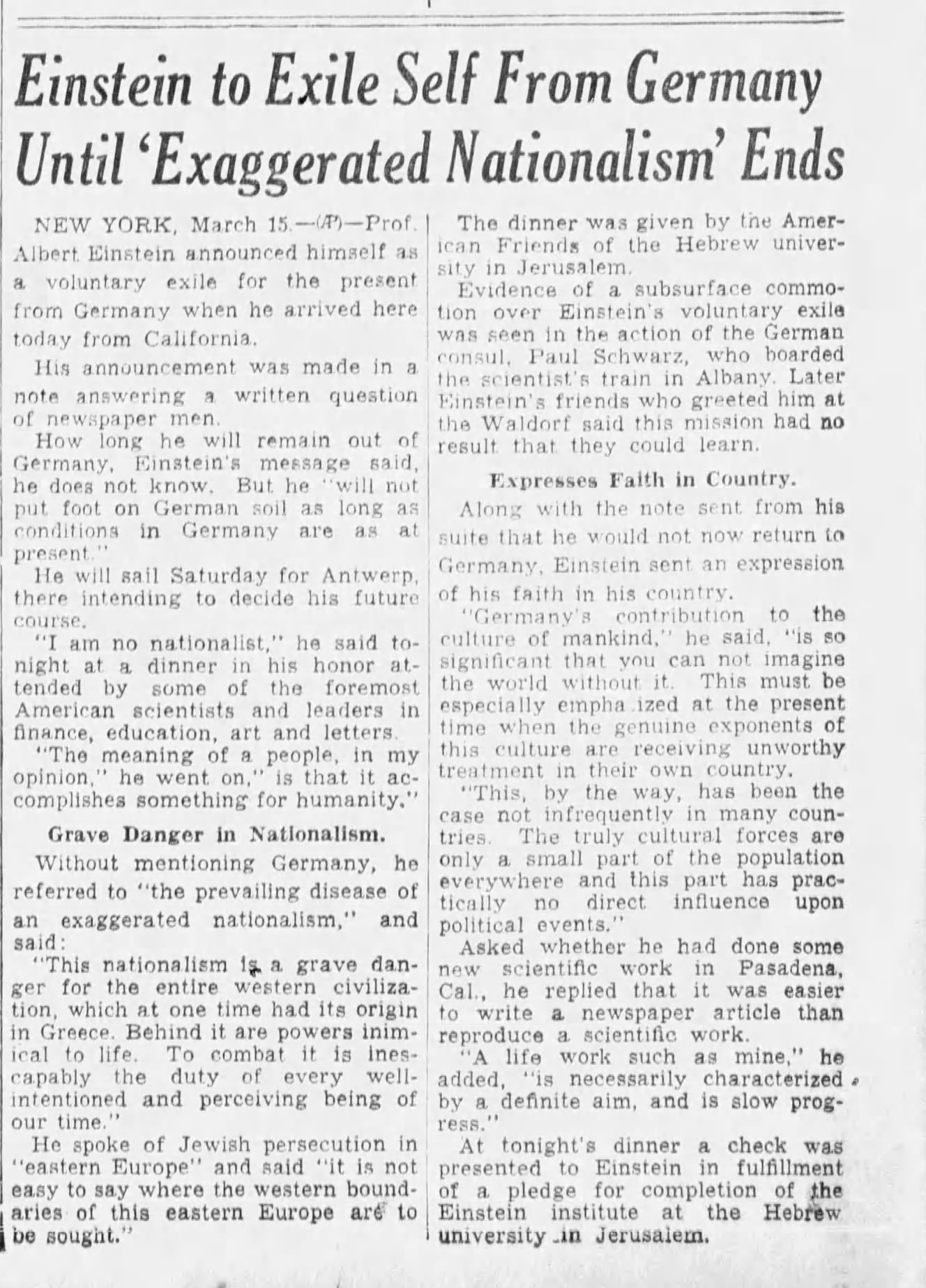- Headline
-
Einstein to Exile Self From Germany until "Exaggerated Nationalism" Ends
- Publication Date
- Thursday, March 16, 1933
- Historical Event
-
Albert Einstein Quits Germany, Renounces Citizenship
This database includes 1,047 articles about this event - Article Type
- Newspaper
- Location
- Page Section and Number
- 17
- Author/Byline
- AP
- Article Text
- NEW YORK, March 15.—(IAP)—Prof. Albert. Einstein announced himself as a voluntary exile for the present from Germany when he arrived here today from California.
His announcement was made in a note answering a written question of newspaper men.
How long he will remain out of Germany, Einstein's message said, he does not know. But he "will not put foot on German soil as long as conditions in Germany are as at present."
He will sail Saturday for Antwerp, there intending to decide his future course.
"I am no nationalist," he said tonight at a dinner in his honor attended by some of the foremost American scientists and leaders in finance, education, art and letters.
"The meaning of a people, in my opinion," he went on," is that it accomplishes something for humanity."
Grave Danger in Nationalism.
Without mentioning Germany, he referred to "the prevailing disease of an exaggerated nationalism," and said:
"This nationalism is a grave danger for the entire western civilization, which at one time had its origin in Greece. Behind it are powers inimical to life. To combat it is inescapably the duty of every well-intentioned and perceiving being of our time."
He spoke of Jewish persecution in "eastern Europe" and said "it is not easy to say where the western boundaries of this eastern Europe are to be sought."
The dinner was given by the American Friends of the Hebrew university in Jerusalem.
Evidence of a subsurface commotion over Einstein's voluntary exile was seen in the action of the German consul, Paul Schwarz, who boarded the scientist's train in Albany. Later Einstein's friends who greeted him at the Waldorf said this mission had no result that, they could learn.
Expresses Faith in Country.
Along with the note sent, from his suite that he would not now return to Germany, Einstein sent an expression of his faith in his country.
"Germany's contribution to the culture of mankind," he said, "is so significant that, you can not imagine the world without it. This must be especially emphasized at the present time when the genuine exponents of this culture are receiving unworthy treatment in their own country.
"This, by the way, has bean the case not infrequently in many countries. The truly cultural forces are only a small part of the population everywhere and this part has practically no direct influence upon political events."
Asked whether he had done some new scientific work in Pasadena, Cal., he replied that it was easier to write a newspaper article than reproduce a scientific work.
"A life work such as mine," he added, "is necessarily characterized by a definite aim, and is slow progress."
At tonight's dinner a check was presented to Einstein in fulfillment of a pledge for completion of the Einstein institute at the Hebrew university .in Jerusalem. - History Unfolded Contributor
- Cammi Q.
- Location of Research
- Newspapers.com (https://www.newspapers.com)
Learn More about this Historical Event: Albert Einstein Quits Germany, Renounces Citizenship
- Nazi Terror Begins
- Boycott of Jewish Businesses
- German Jewish Refugees, 1933-1939
- Einstein Archives Online (The Hebrew University of Jerusalem)
- Einstein Papers Project (The California Institute of Technology)
- The Collected Papers of Albert Einstein (Princeton University Press)
Bibliography
Friedländer, Saul. Nazi Germany and the Jews. New York: HarperCollins, 1997.
Isaacson, Walter. Einstein: His Life and Universe. New York: Simon & Schuster, 2007.
All articles about this event
Download the full newspaper page
See full image on newspapers.com
Newspaper images provided by Newspapers.com
